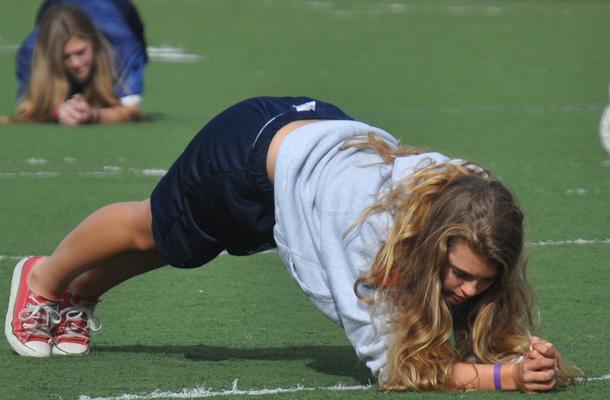Even though suffrage for women was won almost a hundred years ago, girls at Campolindo are still stereotyped as being weaker and less athletic than boys.
Normally, remarks are made about girls spending hours on makeup and hair or getting dressed for school, but it is much more hurtful when girls are called out for being weak or not athletic.
I often find people stereotyped in P.E. While all of the girls in my P.E. class spent an entire period learning how to bat properly, the boys idly threw softballs back and forth. I expected the boys would practice batting the next day, but instead, they just played the game.
Additionally, in some classes, the amount of pushups one must do to get an A varies by gender. In my class, boys have to do 30 pushups while girls only have to do 15 pushups. This is gender bias.
Girls are treated as delicate, more fragile, and weaker than boys. When students play sports in P.E., some teachers want to have teams split up by gender, specifically so that the boys don’t injure the girls. Although I don’t always like playing with overly competitive boys, some girls can be just as fierce, or even more so.
Conversely, guys at this school are pressured to be athletic and strong, when certainly, not all boys are.
They are expected to play any sport in class and be good at it. “I feel it is unfair to categorize guys as always being in great shape,” freshman Nicholas Thompson said.
The media also plays a major part in the objectification, and thus, discrimination against girls. Since all of the models in stores and magazines are extremely tall and thin, girls also feel the need to be that tall and skinny. This affects self-esteem, and compels them to wear inappropriate clothing and spend hours on hair and makeup.
“Sometimes it does make me feel less beautiful,” freshman Christine Wenzel said. “Boys are not as emotional as girls and do not spend as much time looking at the media as girls do.”
Yet, girls are just as responsible for these views.
Their behavior and appearance can send the wrong message. Most clothing nowadays is either see through or extremely short and tight, pants and shirts alike. Girls objectifying themselves can sometimes be the worst form of sexism because by disrespecting themselves, it encourages boys to be degrading to girls as well.
“Boys look up to certain artists and think it is cool to be like them,” Freshman Nia Harper said. Popular songs like “Blurred Lines” by T.I. and Pharell and “Come and Get It” by Selena Gomez objectify girls, and encourage boys to mistreat them. In songs, mostly rap and pop, girls are depicted more like objects than actual human beings. Some songs also imply that girls are victims and lack the strength to fend for themselves.
Simply put, not all girls are weak, and not all boys are athletic and tough. It is unfair for girls to be treated like the weaker gender and to be objectified. Lets start with bring the P.E. standards closer together.


